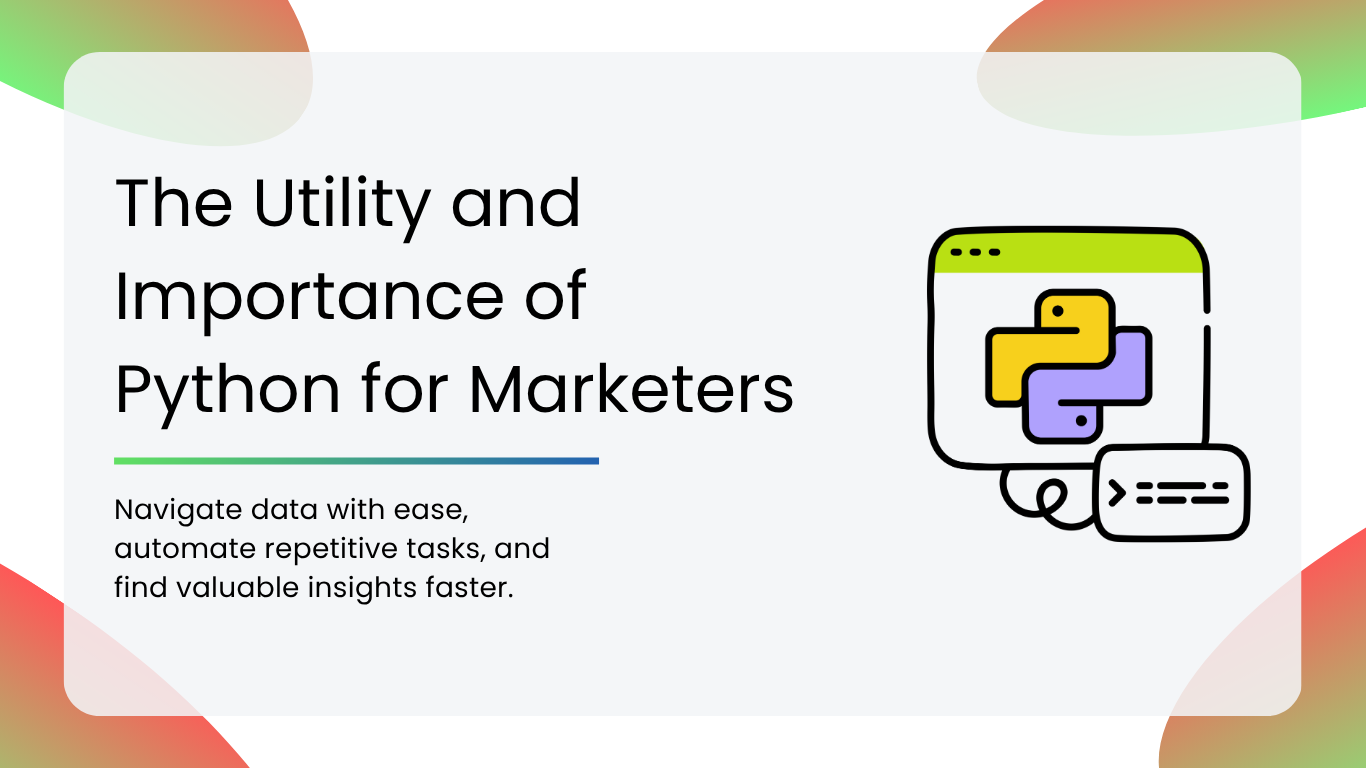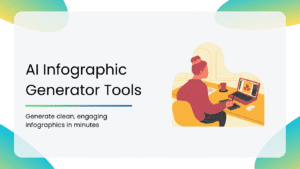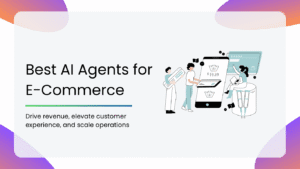Python is everywhere these days, and for good reason! As data becomes more and more central to decision-making, programming is quickly becoming a must-have skill for professionals in every field, including marketing.
For marketers, working with big data is part of the daily grind. Whether you’re diving into years of product data or trying to figure out which customer segment is most responsive to a campaign, analyzing and interpreting numbers is what drives marketing strategies. But let’s face it, sifting through huge amounts of data can feel like drowning in spreadsheets.
Enter coding. Even just knowing the basics of Python can help marketers navigate data with ease, automate repetitive tasks, and find valuable insights faster.
Should You, as a Marketer, Learn to Code?
While coding might not solve every marketing problem, it sure makes data analysis and number-crunching a whole lot easier.
Some people might argue that Excel is all you need. After all, it can handle up to 2GB of data in a single spreadsheet. But the moment you load over 50 MB of data, things start to slow down. Plus, Excel often means spending hours repeating the same formulas over and over. Coding removes that repetition, giving you back the time you’d normally spend on mind-numbing tasks so you can focus on strategy and creativity.
And let’s not forget, in today’s digital world, knowing how to code, even just a little, gives you an edge in the marketing game. Here’s how:
- Clearer Communication with Tech Teams: Knowing basic coding means you can talk the same language as developers. Instead of vague requests, you can specify exactly what you want from your website or portal.
- Time & Cost Savings: Automating routine tasks like data cleaning, report generation, and campaign tracking saves hours of work and cuts down on errors.
- Smarter, More Targeted Campaigns: Python allows for deeper data analysis, helping you identify trends and patterns in customer behavior. This means you can create highly targeted marketing campaigns that are more likely to hit the mark.
- Stronger Problem-Solving Skills: Programming teaches you logical thinking and structured problem-solving, skills that are super useful in marketing, whether you’re troubleshooting issues or testing new strategies.
- Enhanced Digital Marketing Abilities: With coding knowledge, you’ll understand how things like SEO, web analytics, and ad tech work behind the scenes, giving you more control over your campaigns.
In short, coding isn’t just for developers. For marketers, it’s a game-changer.
Choosing the Right Language
Now that you’re convinced coding can take your marketing to the next level, the big question is: where to start? There are plenty of programming languages to choose from like SQL, JavaScript, R, Python, but for marketers, the decision usually comes down to R vs. Python.
Both languages are great for data science and visualization, which is why they’re so powerful for marketing analytics. But here’s the key difference: R was created by statisticians and academics, which makes it extremely powerful, but also a bit harder to learn. Python, on the other hand, is user-friendly and designed to be accessible to people without a math or tech background.
Simply for its accessibility and ease of learning, Python for Marketers is a clear win, at least at the start of the journey. Moreover, Python is better at automation of manual data processes when compared to R. While R may be better for deep-dive statistical analysis, Python is more useful for deployment and reproducibility of said analysis.
At the end of the day, Python for digital marketing isn’t just about crunching numbers. It is a sure shot to better visuals and consequently a more engaged audience.
Four Ways Python Can Spruce Your Marketing Game
Still unsure whether Python is worth your time as a marketer? Here are four ways it can seriously boost your marketing game:
1. Python for Marketing Automation
Think about all those repetitive tasks you do every week, like analyzing sales data. Instead of manually downloading reports, filtering through data in Excel, and applying the same formulas over and over, Python can handle it in seconds. A simple script can pull your data, sort it, and generate a report, that too, all automatically. That means less time on spreadsheets and more time for strategy!
2. Python for Campaign Automation
Running marketing campaigns for a small brand with a handful of products is easy. But what about an e-commerce giant with hundreds or even thousands of products? Manually setting up campaigns for each one can be a nightmare. Python automates this process, saving you tons of time while keeping everything running smoothly.
3. Python for Search Engine Optimization
SEO isn’t just about content; it’s about structure, speed, and optimization. Python can automate tasks like analyzing keyword performance, optimizing meta descriptions, and checking for broken links. With the right Python script, you can clean up your site, improve your rankings, and drive more organic traffic—all without manually checking each page.
4. Python for Marketing Analytics
Data is the foundation of modern marketing, but numbers alone don’t tell the full story. You need insights. Python can help you run A/B tests, track customer behavior, analyze campaign performance, and even process customer feedback using natural language processing. The result? Smarter, more effective marketing decisions.
Beyond these four, there are also many other ways in which artificial intelligence can be used by marketers, where Python would play a key role.
So, let’s look at how you can get started with Python!
How to Get Started
Learning Python is easier than you might think, and there are plenty of free resources to get you started.
1. Download & Set Up Python
Head over to Python.org and download the latest version. It’s free, open-source, and beginner-friendly. Once installed, you’re ready to dive in!
2. Learn the Basics with Online Courses
Not sure where to start? Online platforms like Coursera, Udemy, and Udacity offer excellent beginner courses. Here are a few to check out:
- Automate the Boring Stuff with Python (Udemy): Perfect for learning real-world automation tasks.
- Automate the Boring Stuff (Website): A free, hands-on resource teaching practical Python applications.
- Python for Everybody Specialization (Coursera): A beginner’s guide to coding, broken down into easy steps.
3. Pick Up a Beginner-Friendly Book
If you prefer learning through books, Python Crash Course by Eric Matthes is one of the best beginner books out there. It’s easy to follow and packed with hands-on exercises.
4. Join the Python Community
You’ll have questions along the way, and that’s totally normal! Stack Overflow, Reddit, and GitHub are great places to ask for help, share projects, and learn from other Python enthusiasts.
5. Start Practicing with Marketing Use Cases
Once you’ve got the basics down, start applying Python to real-world marketing tasks like automating reports, analyzing campaign data, or optimizing SEO. The best way to learn is by doing real projects!
Python is one of the most marketer-friendly programming languages out there. Give it a shot, and soon you’ll be automating tasks, making data-driven decisions, and taking your marketing strategies to new heights!
Key Takeaways
- Coding isn’t mandatory for marketers, but it’s a game-changer: It helps with data crunching, analysis, and visualization, making marketing decisions sharper and more efficient.
- Python is the perfect starting point: Its simplicity, accessibility, and versatility make it the go-to language for marketers stepping into coding.
- Explore automation, analytics, and optimization: Python streamlines workflows, automates repetitive tasks, and enhances marketing insights with data-driven precision.
- A must-have tool for digital marketers: With its powerful analytical and visualization capabilities, Python can elevate SEO, campaign performance, and audience engagement.
- Getting started is easy and free: As an open-source language, Python offers a range of online courses, tutorials, and communities to help you learn at your own pace.
If you’re ready to future-proof your marketing skills, now is the time to dive into Python and start experimenting.
FAQs
While coding isn’t mandatory for marketers, learning Python can significantly enhance data analysis, automation, and campaign optimization, making your work more efficient and impactful.
Not at all! Python is known for its simple and readable syntax, making it one of the easiest programming languages to learn, even for those without a technical background.
Python allows marketers to automate repetitive tasks like data collection, campaign management, and SEO analysis, saving time and reducing manual effort.
Online platforms like Coursera, Udemy, and free resources are great places to start. Communities like Stack Overflow and GitHub can also help with real-world problem-solving.
Disclosure – This post contains some sponsored links and some affiliate links and we may earn a commission when you click on the links, at no additional cost to you.





